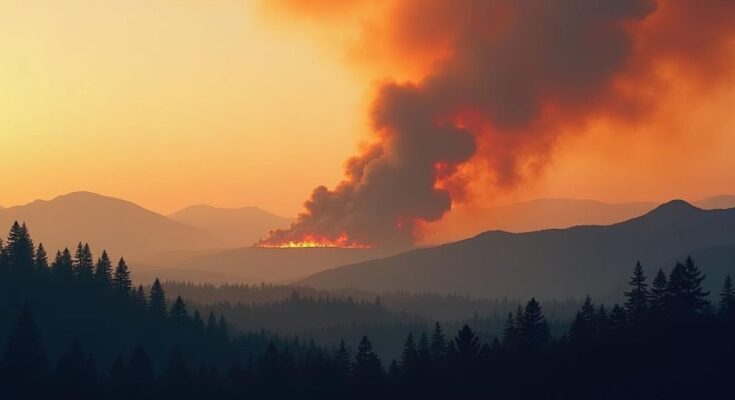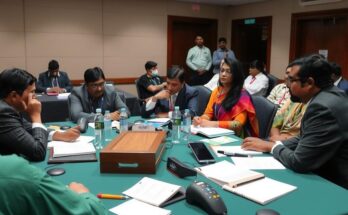South America is currently engulfed in a series of destructive wildfires fueled by human activity and exacerbated by drought conditions. The crisis, affecting countries such as Brazil, Peru, and Paraguay, has led to significant health issues among residents due to poor air quality. Experts emphasize that the fire crisis is a continent-wide problem linked to climate change, and local leaders express urgent calls for action to address the deterioration of the environment and public health.
“The sky, which was once celebrated as forever blue in the official anthem of Rondônia, has been blanketed in smoke caused by devastating man-made wildfires throughout South America. During recent months, vast areas from Ecuador to Paraguay and deeper into the Amazon have experienced these calamities, resulting in significant air quality deterioration. The situation has escalated to the point where flights have been impeded in Porto Velho, Rondônia, with schools forced to close due to hazardous conditions. Dr. Lilian Samara de Melo Lima, a general practitioner in the region, reported a sharp increase in respiratory ailments, migraines, and eye problems among residents, exacerbated by the dense smog. Dr. Lima attributed the unprecedented severity of this year’s wildfires to the aggressive encroachment of ranchers and farmers into previously untouched jungles, describing their methods as “devastating, predatory, reckless.” Marilene Penati, the health secretary of Porto Velho, echoed these sentiments, stating that the air quality and health of the city’s 500,000 residents are at risk. Researchers, including Erika Berenguer from Oxford University, have determined that the fires are not isolated to Brazil but are a continent-wide crisis, significantly worsened by a historic drought linked to climate change and the El Niño phenomenon. Satellite data shows an alarming number of fire hotspots in various countries, including Colombia, Guyana, and Venezuela. Paraguay is particularly affected as wildfires ravage the Chaco ecosystem, and recent blazes have displaced the local Ayoreo nomadic community, which relies on the forest for their livelihood. Peru is grappling with similar challenges, where at least 20 deaths have been attributed to forest fires sweeping across the country’s regions, with some officials attributing it to traditional agricultural practices despite evidence of intentional land clearing. In Ecuador, paramedic Christian Rivera highlighted the overwhelming scale of the crisis, observing that the fires are symptomatic of broader global heating trends. Meanwhile, Bolivia’s agricultural region of Santa Cruz has declared a national disaster as millions of hectares of forest are lost in this ecological catastrophe. Amid these challenges, Penati expressed profound concern, emphasizing that “the Earth is sick … the Earth is crying out for help” as the region faces what many believe is the worst environmental disaster in its history. She lamented society’s failure to heed the warnings, remarking, “I feel so, so sad because we’re hurting our planet and we need to care for her – because we are killing ourselves.”
The ongoing wildfires across South America, particularly in the Amazon rainforest and surrounding regions, serve as a grim reflection of the impact of human activities and climate change. These fires, significantly exacerbated by drought conditions related to natural climate phenomena like El Niño, have outpaced the typical annual burning of the forest, escalating into a continental crisis. The encroachment of agricultural practices into pristine jungles has prompted unprecedented levels of destruction, threatening both the environment and Indigenous communities. Health professionals and local leaders have voiced their concerns regarding deteriorating air quality and health impacts on residents, underscoring a growing urgency to address this environmental emergency.
In conclusion, the wildfires devastating South America represent a dire environmental crisis that transcends national borders. As air quality diminishes and public health suffers, experts warn of the drastic repercussions of unchecked agricultural expansion and climate change. Despite the clear indications of a global heating trend and the corresponding ecological disasters, the response to these warning signs remains insufficient. Leaders, scientists, and advocates alike stress the importance of collective action to address these crises, emphasizing the need to protect the planet for current and future generations.
Original Source: www.theguardian.com




